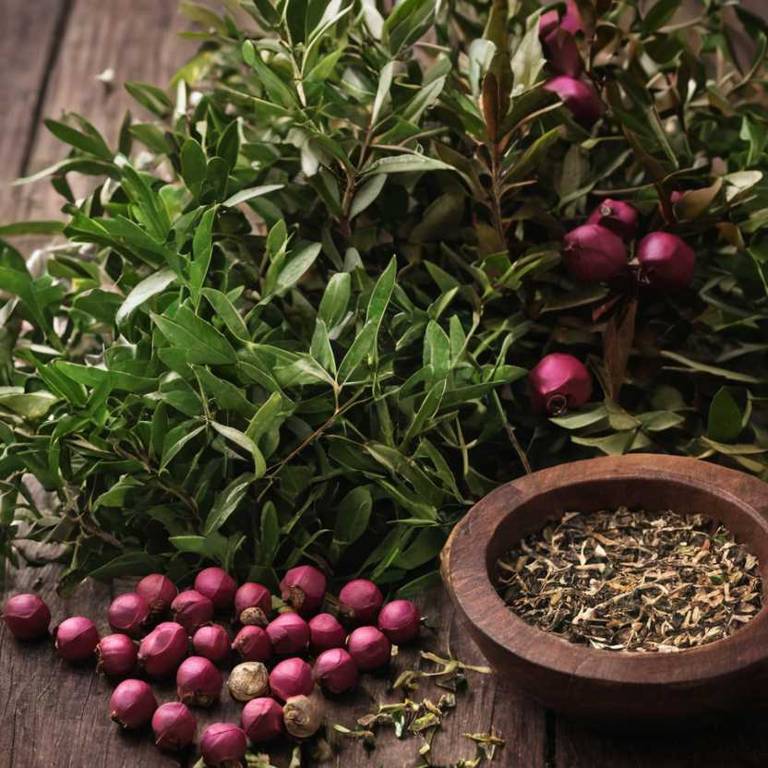By Leen Randell
Updated: Jul 20, 2024
10 Medicinal Constituents Of Syzygium Aromaticum (Cloves)

Syzygium aromaticum has active constituents such as eugenol, eugenol acetate, and beta-caryophyllene.
These compounds exhibit analgesic, anti-inflammatory, and antimicrobial properties. Eugenol, in particular, has been shown to provide pain relief and reduce inflammation, making it beneficial for managing dental pain, headaches, and muscle cramps.
By alleviating these conditions, individuals can improve their quality of life and resume daily activities with greater ease.
This article explains in details the 10 best active constituents of Syzygium aromaticum.
1. Eugenol
Syzygium aromaticum eugenol is a natural compound extracted from the essential oil of the plant.
It is a colorless liquid with a pungent, sweet, and spicy aroma. Eugenol has been used for centuries in traditional medicine, cosmetics, and food preservation due to its antibacterial, anti-inflammatory, and antioxidant properties.
It is also commonly used as a flavoring agent in foods and beverages, particularly in the production of baked goods, candies, and soft drinks.
2. Cinnamic acid
Syzygium aromaticum cinnamic acid is a naturally occurring compound found in the essential oil of these aromatic spices.
It has been extensively studied for its potential health benefits, including anti-inflammatory and antimicrobial properties. Cinnamic acid has also been shown to exhibit antioxidant activity, protecting cells from damage caused by free radicals.
Additionally, it has been used as a flavoring agent and food additive, adding a sweet and warm aroma to various products.
3. Methyl eugenol
Syzygium aromaticum methyl eugenol is a bioactive compound extracted from the essential oil of clove buds.
This natural phenolic has been extensively studied for its biological and pharmacological properties, including antimicrobial, antioxidant, and anti-inflammatory activities.
Methyl eugenol has been shown to possess insecticidal and repellent effects, making it a potential alternative to synthetic pesticides in integrated pest management strategies.
4. Caryophyllene oxide
Syzygium aromaticum caryophyllene oxide is a naturally occurring compound found in the essential oil of these fragrant spices.
This sesquiterpene oxide has been widely studied for its potential health benefits, including anti-inflammatory, antimicrobial, and antioxidant properties.
Caryophyllene oxide has also been shown to possess anxiolytic and sedative effects, making it a promising compound for the treatment of various neurological disorders.
5. Limonene
Syzygium aromaticum limonene is a natural monoterpene compound found in its essential oil.
This bioactive compound has been extensively studied for its numerous health benefits, including anti-inflammatory, antimicrobial, and antifungal properties. Limonene has been shown to exhibit potent antioxidant activity, scavenging free radicals and protecting against oxidative stress-induced cellular damage.
Its applications range from traditional medicine to food preservation and aromatherapy.
6. Α-pinene
Syzygium aromaticum α-pinene is a natural compound extracted from the leaves of this plant.
It is a monoterpene hydrocarbon that is responsible for the distinctive aroma and flavor of cloves. Alpha-pinene has been found to possess various biological activities, including antioxidant, anti-inflammatory, and antimicrobial properties.
It is also used as a flavoring agent in food, beverages, and perfumes, and is believed to have potential therapeutic applications in traditional medicine.
7. Β-caryophyllene
8. Terpinen-4-ol
Syzygium aromaticum terpinen-4-ol is a natural compound extracted from the essential oil of the clove plant.
It has been used for centuries in traditional medicine and aromatherapy due to its potent antimicrobial and antifungal properties.
Terpinen-4-ol is believed to possess anti-inflammatory and analgesic effects, making it an effective remedy for various health issues, including skin infections and digestive problems.
9. Linalool
Syzygium aromaticum linalool is a bioactive compound extracted from the essential oil of this spice.
Linalool has been extensively studied for its various biological activities, including antioxidant, anti-inflammatory, and antimicrobial properties.
It has also been shown to possess anxiolytic effects, making it a potential therapeutic agent for anxiety disorders.
10. Cis-caryophyllene oxide
Syzygium aromaticum cis-caryophyllene oxide is a bioactive compound derived from the essential oil of this spice.
It possesses remarkable pharmacological properties, including anti-inflammatory, antimicrobial, and antioxidant activities. Cis-caryophyllene oxide has been shown to exhibit neuroprotective effects, inhibiting the production of pro-inflammatory cytokines and reducing oxidative stress in various models of inflammation and disease.
Its potential therapeutic applications include the treatment of neurological disorders, such as Alzheimer's disease and Parkinson's disease.